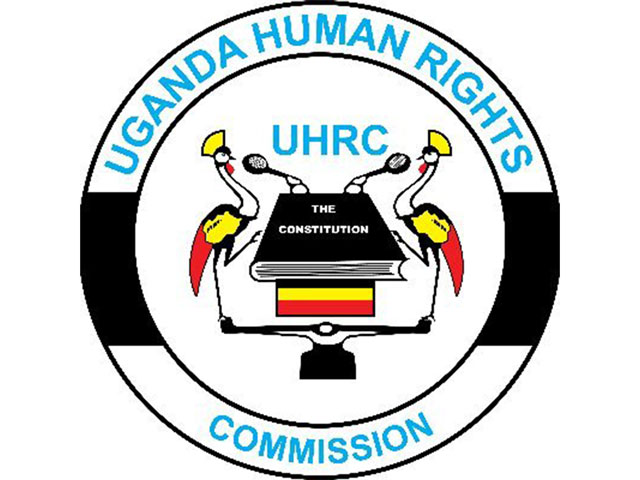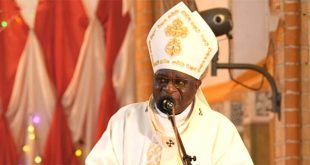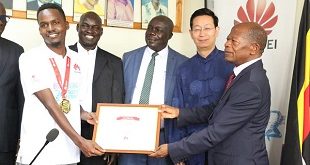
Kampala, Uganda | THE INDEPENDENT | On March 12, 2021, two unexpected visitors from Uganda Human Rights Commission turned up at the home of Karim Muganga. They were interested in taking up his torture case.
Muganga is among dozens of Bobi Wine supporters who were kidnapped, tortured and released by security without charge. Muganga, 24, a taxi conductor was kidnapped on December 21 2020, from Kabembe Stage along Kayunga road in Mukono North. He spent 53 days in detention at an unknown facility going through torture.
In an earlier interview, Muganga told URN that he was subjected to various forms of torture including being forced to eat three kilograms of posho and a kilogram of beans in 20 minutes. Muganga was released on February 12, 2020.
He returned home with a damaged left eye and ear because of torture. The Uganda Human Rights Commission visited a week after URN published a story detailing his torture. All Uganda Human Rights Commission officials wanted to know was how he was tortured.
“They asked me a series of questions to tell them what happened to me. I told them that my left eye and ear were injured and also narrated all I went through,” he said.
They opened a torture file but also gave Muganga a letter introducing him to the African Center for Treatment and Rehabilitation of Torture Victims (ACTV), situated in Kanyanya to get medical assistance.
“The purpose of this letter, therefore, is to request you to examine and treat Mr. Karim Abdul. Please avail the commission with the report of your findings and the victim’s health status,” the UHRC letter reads. He also received Shillings 33,000 for transport.
At ACTV, Muganga says he was examined and given amoxicillin capsules to treat the pains in the stomach he suffered due to continuous kicks while in the torture chambers. He says he took them for three days. When they were done, Muganga went back to get more medication but also told them that he had problems with his left eye and ear. The doctors examined Muganga and referred him to UMC Victoria Hospital situated in Ntinda.
At UMC Victoria, Muganga says he was examined again but the doctor gave him Ibrufen tablets to first heal the pain in the body and told him that they could not treat the injured eye and ear from the hospital due to limited resources.
Muganga says the doctor gave him a medical form and a number of a doctor working at Life link hospital who could give him better treatment. At Life Link, Muganga says he was examined and the doctor told him that his eye was badly injured, having a blood clot with pressure on it. He also told him that his eardrum had been damaged and that he needed to go to Mengo for better management.
He was not given any medication. According to Muganga, the examination services he got at life link hospital were fully paid for by UMC Victoria hospital. It’s this moving to different facilities without getting medication that dampened Muganga hope.
A letter he thought would bring an end to the pain and anxiety about his ear and eye turned out to be another mere paper. He gave up.
Juliet Logose, the head of Uganda Human Rights Commission Central Regional Office who signed the letter says that they learnt about Muganga’s case through media and decided to initiate a probe. She says that they have a close working relationship with ACTV. The letter was an introduction in which, ACTV was supposed to take up medical bills.
“Treatment is part of investigations. Victims need treatment even when you’re looking for long term compensation,” she says. Logose says they encounter hurdles where victims do not give feedback. That is what Muganga did. “There is always a need for communication. If he feels he was not treated, he should have communicated. We give them toll-free lines,” she says.
Samuel Herbert Nsubuga, the Chief Executive Officer ACTV says when the UHRC refers clients to them; they are treated with physical and psychological torture effects. He says Medical UHRC uses the medical reports they give the torture victims during the tribunal hearing and awards compensation.
“All our interventions are at no cost to the survivor of torture. Whoever passes through our gates to be treated and rehabilitated does not pay a single Shilling. We cover all the costs, we have development partners who support us in paying for the drugs and paying for the services of our doctors, counsellors and clinical psychologists,” he says.
Nsubuga also says it becomes problematic when patients do not give feedback. He appeals to the patients to always return to the hospital after referral once they encounter difficulties because if they do not, this creates a communication gap and laxity in getting updates.
Nsubuga said they do not have a structure of following up patients if they do not return to report. He says they will put in place a mechanism of independently following up patients who do not report back.
*******
URN
 The Independent Uganda: You get the Truth we Pay the Price
The Independent Uganda: You get the Truth we Pay the Price


